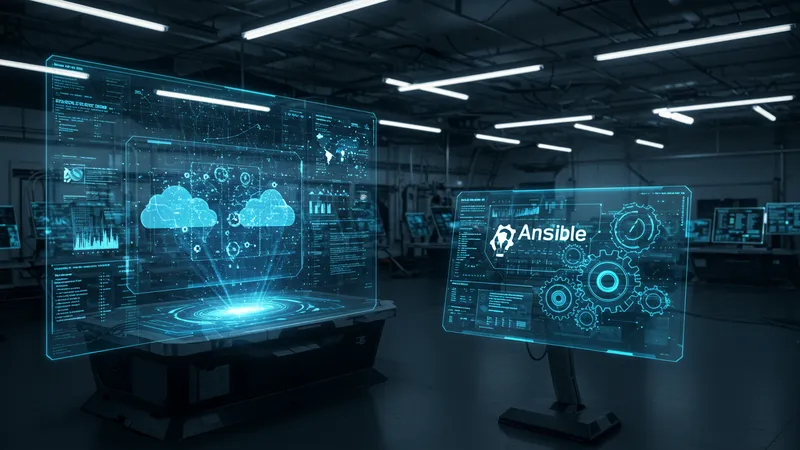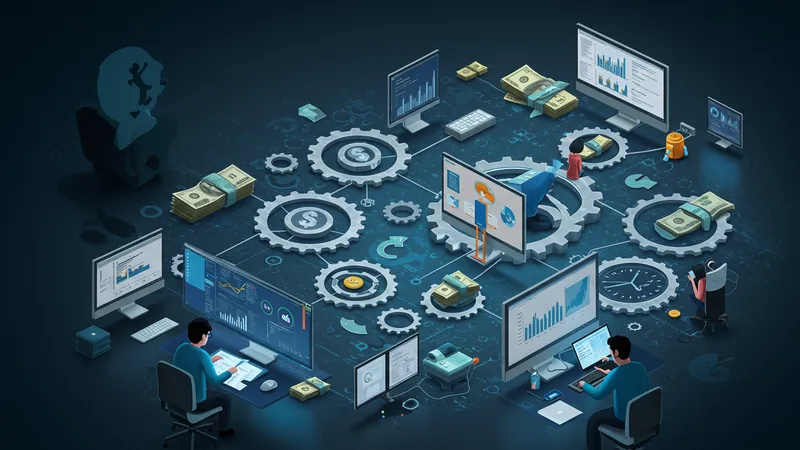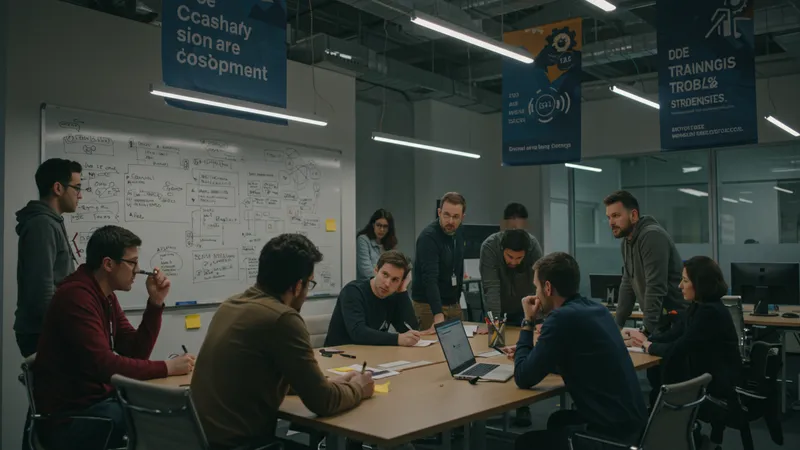In the fast-evolving world of technology, the year 2025 has unveiled a surprising array of DevOps tools that claim to accelerate CI/CD pipelines like never before. These tools are not just for tech gurus; they promise significant efficiency for organizations across the globe.
With the pressure to reduce development time while increasing software reliability, staying updated with these tools has become crucial. Whether you’re a startup or an industry giant, integrating the right DevOps tools can redefine your operational success today.

It's shocking but true: a staggering 60% of firms are leveraging AI-powered tools to write deployment scripts faster and more accurately than ever before. It seems the days of manual scriptwriting could be numbered. But that’s not even the wildest part…
While some tools promise greater efficiency, others integrate AI to predict and solve issues before they disrupt your workflow. Imagine not having to react to problems but rather preempting them entirely! This proactive approach is reshaping infrastructure management. But hold on — what happens next defies even the boldest anticipations…
Are you ready to discover the tools that might forever change your approach to software deployment? The forthcoming revelations stunned even seasoned experts…
In 2025, DevOps isn’t just a department or a practice; it’s a full-fledged organizational transformation. Companies are not only adopting but relying on DevOps tools to achieve unparalleled agility and innovation. The traditional silos between development and operations are crumbling, giving rise to a collaborative culture.

The most groundbreaking change is the integration of machine learning algorithms into these tools. They’re more than just automating tasks; they’re predicting failures, optimizing processes autonomously, and learning from each iteration. This massive leap means human error might soon become an anomaly. But there’s one more twist…
For many, the keyword is "autonomy." Autonomous DevOps pipelines have captured the imaginations of tech leads around the world. Significantly reduced downtime and error rates mean that team leads can focus on innovation instead of micromanaging deployments. What you read next might change how you see this forever.
Large tech firms have established dedicated "DevOps innovation teams" to continuously adapt and integrate the latest tools. This isn't just a trend; it's a necessity in a world where speed and efficiency dictate market leadership. But the challenges that arise from these rapid changes will surprise you…
Amidst popular DevOps tools, lesser-known automation tools are making considerable waves. Consider tools like Kubernetes, which goes beyond container orchestration by automating rollouts and rollbacks, thus minimizing manual intervention in deployments. It’s not just a tool but an integral component of modern cloud-native apps.

Another tool gaining traction is Ansible, known for its simple yet powerful automation in configuring and managing systems. It handles complex deployments with ease, reducing deployment error rates by up to 40%. But that’s not all this tool can surprise you with…
Unbeknownst to many, these tools are increasingly integrating AI-driven augmentation features, which optimize and streamline even unpredictable tasks. Imagine a system that anticipates problems before they surface, making proactive adjustments. But what if I told you there's still more?
The rapid advancement of these tools means many IT professionals find themselves in a constant learning mode. Staying relevant requires embracing continuous education, adapting quickly, and, in some cases, unlearning outdated methods. This dynamic creates a competitive edge hard to ignore, but guess what's coming next...
Falling behind in the DevOps race doesn’t merely mean slower delivery times; it can lead to significant financial loss. Companies not investing in these tools are observing a noticeable gap in their operational efficiency and innovation pace. ROI on these tools often exceeds initial expectations.

Research shows that firms not integrating the latest DevOps practices are seeing a 30% lag behind their competitors in product launches. Missed opportunities mount as market leaders surge ahead, leveraging technology to deliver faster and smarter than ever. But the real cost goes beyond finances…
The pressure to match or exceed technological capabilities isn't just about competition; it's about survival in an increasingly digitized marketplace. This shift requires companies to reevaluate their IT budgets, making room for necessary investments or risk obsolescence. Yet, there’s a sneaky issue lurking beneath…
The knowledge gap widens as technology evolves, making it crucial for organizations to upskill their workforce. Training programs tailored to DevOps proficiency are no longer optional — they’re vital. But how ready are you to face the unanticipated aspects of this evolution? What you’ll read next may just redefine your approach…
Throughout 2025, remarkable success stories have emerged from companies embracing state-of-the-art DevOps tools. Giants like Amazon leverage advanced automation, leading to historical lows in deployment failures and generating tremendous cost savings. These successes are stories of not just survival but industry domination.

Incorporating DevOps effectively has enabled organizations to pivot swiftly, implement changes on the fly, and manage massive surges in user demand seamlessly. The success of Netflix, for example, is frequently cited, with its ability to execute thousands of deployments daily thanks to comprehensive DevOps strategies. But there’s another gem hidden in these stories...
These success stories highlight a common thread: the emphasis on culture within tech teams. A culture that prioritizes collaboration, learning, and resilience. The synergy between human expertise and automated intelligence creates powerhouse teams pushing boundaries like never before. Ever wondered what's essential in fostering such innovation?
As more companies publish testimonials of their DevOps triumphs, the pattern is undeniable: investment in talent and technology yields considerable dividends. Are you ready for the next compelling narrative that could inspire your own DevOps journey? There's more to uncover as this narrative unfolds...
The confluence of AI with DevOps is a frontier pushing boundaries. AI isn’t just an add-on to DevOps pipelines; it’s an essential driver of smarter operations. With AI’s ability to analyze and react to data faster than humans, it’s influencing the overall software development lifecycle in unprecedented ways.

The infusion of AI ensures that pipelines become more resilient, optimizing code quality and reducing bugs before deployment. This predictive nature of AI is not futuristic fiction; it’s happening today, shaping the landscape considerably. So, why is this blend of AI with DevOps such a pivotal transformation?
Organizations leveraging this synergy gain an edge by using predictive analytics to foresee trends and user behaviors, leading to more informed decision-making. This approach effectively shrinks development cycles, freeing up resources for innovation. Is your organization prepared for what AI can unveil next?
The potential of AI in DevOps is expansive, pushing organizations towards more strategic, data-driven decisions. As their capabilities expand, so does the sophistication of software products, leading us to a compelling era of digital advancement. Yet, with such opportunities come significant challenges... what’s next might just redefine our approach to software development.
Implementing DevOps tools, while hugely beneficial, can incur hidden costs that often go unnoticed. Initial integration expenses can run high, including both monetary investments and time-consuming training for teams to adapt to new methodologies.

Additionally, choosing the wrong tool due to inadequate analysis of specific organizational needs can lead to wasted financial resources and decreased productivity. The initial promise of seamless integration can quickly become a financial drain. But this isn’t the only challenge lurking where you least expect...
Maintenance of these tools, which are constantly evolving, requires ongoing investment in updates and personnel training to keep everything running smoothly. Overlook these, and you might face unexpected bottlenecks or downtimes. What might look like simple upgrades often mask a cascade of hidden costs.
Yet, despite these hidden costs, the ROI can be significant if managed wisely. The key lies in meticulous planning and continuous evaluation. Can you afford to neglect these critical insights, knowing what lies beneath? What emerges next is a revelation...
Despite the clear advantages, some companies remain hesitant about fully embracing DevOps technologies. The resistance often stems from fear of change, disrupting established processes, and the need to invest in employee retraining.

Companies are sometimes wary of the overhaul required in transitioning from legacy systems to modern, agile frameworks. The migration process can appear daunting, presenting risks to ongoing operations. But there’s another layer to this reluctance...
Organizational culture plays a significant role, as entrenched hierarchies and fragmented communication channels can hinder DevOps adoption. The shift often challenges the status quo, which may face resistance from within. Understanding these cultural dynamics is crucial for seamless integration.
Overcoming these barriers requires a strategic approach, involving clear communication of benefits and inclusive upskilling initiatives. Yet, the reality of what adoption means for these hesitant companies poses questions you’ll want answered. The insights following next will be enlightening...
The role of DevOps engineers in 2025 has shifted dramatically, blending traditional IT responsibilities with strategic contributions. Engineers are now expected to not only manage pipelines but to enhance system reliability and security.

With the proliferation of AI, the expectation for these engineers to incorporate intelligence-driven automations has elevated their importance. Their roles expand, demanding a higher degree of innovation and adaptability. But the transformation doesn’t stop here...
This evolving role blurs lines, pushing engineers to engage more closely with cross-functional teams, including developers and business leaders. The demand for hybrid skill sets — a blend of technical prowess and strategic acumen — is evident.
Such changes pave the way for evolving career pathways and opportunities. It’s a career that demands constant learning and unlearning, staying ahead of the rapid tech evolutions. The future holds even more intriguing transformations in this role. Your understanding will soon reach new depths...
Industry leaders are enthusiastic about the transformational benefits of advanced DevOps tools, lauding their impact on operational efficiency and innovative potential. They highlight the shift towards agile methodologies as a significant leap forward.

Executives from top tech firms echo that embracing these tools isn’t just about keeping up but setting trends. The ability to rapidly adapt and respond to market demands keeps them competitive and relevant. But there’s an undercurrent of caution in their endorsements...
The importance of strategic thinking in the adoption and integration process isn’t understated. Industry veterans stress that without a solid strategy, tools alone won’t fulfill their potential. They advocate for a methodical approach, aligning tools with business goals.
The consensus is clear: the era demands not only technological investments but also a cultural shift towards adaptability and continuous improvement. What’s unveiled in the following questions will be crucial for businesses aiming for leadership in this arena...
Selecting the right DevOps tool is essential for ensuring efficiency and achieving desired outcomes. The vast array of options necessitates a careful approach to align tools with organizational goals and team capabilities.

Start by evaluating your current processes, identifying areas where productivity can be enhanced or bottlenecks removed. Involving stakeholders in the decision-making process ensures that the chosen tools address real challenges and streamline workflows. Missing this step can be costly...
Consider flexibility and scalability when selecting tools — they should cater to your current needs and future aspirations. Trustworthy vendors with a proven track record and customer support are often the most reliable choice, offering peace of mind.
Finally, the integration phase requires meticulous planning to avoid disruptions. Assessing the total cost of ownership, including training and ongoing support, is vital. The decisions here carry weight, and what's next will guide you through more critical considerations...
In 2025, refining your DevOps strategy is critical for leveraging the full potential of tools and methodologies available. It’s about more than just technology — it’s about creating a resilient and adaptable business model.

Continuous assessment and adaptation of strategies to align with evolving technology trends and organizational changes ensure that DevOps initiatives deliver optimal results. This alignment involves frequent revisiting of strategies to handle new challenges.
The human element is indispensable. Investing in team development and fostering a culture of collaboration and innovation strengthens the backbone of any DevOps strategy. People drive the change, not just the tools.
The extent of your strategy’s impact depends on how effectively you balance technology, people, and processes. The next revelation will unveil crucial strategies to consider in your DevOps evolution...
The trajectory of DevOps technologies points towards even more exciting developments, such as the deeper integration of AI and machine learning. These advances promise to further reduce human oversight, optimizing processes autonomously.

Looking ahead, DevOps is poised to become a central framework, dictating the rhythm of tech evolution. The swift progression will likely spawn entirely new roles and capabilities, reshaping the tech workforce landscape permanently.
Organizations will increasingly pursue end-to-end automation, striving for zero-downtime environments. Embracing these shifts will demand agile mindsets and adaptive strategies that reflect evolving consumer needs and technological capabilities.
The implications of these developments are far-reaching, suggesting a future where seamless, rapid software deployment is the norm. Yet, the revelations don't end here. What lies ahead in this narrative will alter your understanding profoundly...
While the benefits of evolved DevOps tools are apparent, unexpected challenges often rise during their implementation. Cultural resistance within teams can hinder effective adoption, necessitating open communication and change management strategies.

The technological complexity of some tools can overwhelm teams unprepared for the rapid advancements, resulting in inefficiencies and frustration. Consistent training and development initiatives are crucial to bridge these knowledge gaps.
Choosing the right tools amidst a crowded and competitive market can pose difficulties, often leading to buyer’s remorse if not approached with a comprehensive strategy. Informed decision-making is crucial for maximizing investments.
By addressing these challenges head-on with strategic foresight and thorough planning, organizations can turn potential setbacks into opportunities for growth and refinement. The final insights will unravel solutions and inspire action moving forward...
2025 marks a pivotal year for DevOps, introducing transformative tools and paradigms that stand to redefine CI/CD pipelines. An extensive understanding and strategic adoption of these innovations can immensely benefit organizations.

Key takeaways encompass the vital integration of AI to boost pipeline efficiencies, the constant need for adapting strategies to align with evolving trends, and the continuous importance of skillful, educated teams leading these transitions.
The balance of technology and human effort remains paramount, emphasizing culture and collaboration as critical components. As firms prepare for the future, adopting adaptable strategies ensures long-term success and resilience.
As we draw to a close, one thing remains clear: significant potential awaits those ready to harness these breakthroughs with vision and innovation. This concluding insight invites you to share in the conversation and prepare for the journey ahead...
The 2025 DevOps landscape brings a powerful reminder: innovation is relentless, and adaptability is crucial. Organizations equipped with the right tools and mindset will lead the charge, embracing change with confidence. This isn't just a technological evolution; it's a cultural and strategic revolution that demands participation. Share this article, bookmark it for future reference, and let these insights guide your next steps in a rapidly evolving digital universe.